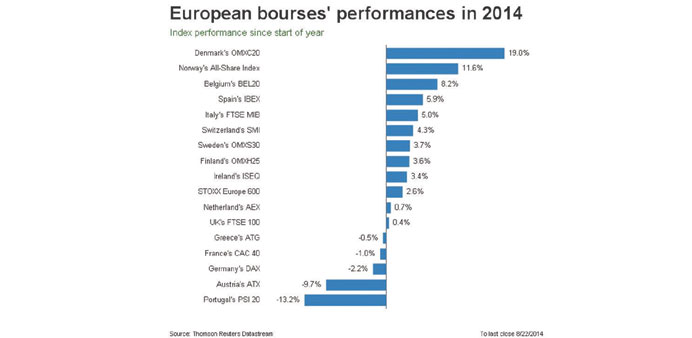Reuters/Paris/London
The cheapest valuations in almost a decade relative to the rest of Europe are failing to attract investors to Germany’s stock market as confidence ebbs in the region’s largest and most stable economy.
Germany’s DAX, the eurozone’s best-performing stock market in the five years since Lehman Brothers collapsed, is lagging all other major markets so far this year.
The DAX’s recent sharp sell-off, sparked by jitters over the Ukrainian conflict, Berlin’s souring relationship with Moscow and last week’s 0.2% second-quarter contraction in the German economy, has left the index down 3.5% for 2014.
“Germany’s growth momentum is losing steam. The economy is hitting a ceiling, although at this point it’s nothing too dramatic,” said Jeanne Asseraf-Bitton, the head of global cross-asset research at Lyxor AM, which has $112bn in assets under management.
“It makes the German stock market not the sexiest place to invest in. There’s more upside potential elsewhere.”
Thursday’s Markit flash composite Purchasing Managers’ Index, which tracks growth in manufacturing and services, helped calm nerves. But unease about the direction of the German economy remains.
The confrontation with Russia, to which German companies are more exposed than firms in many other European countries, has exacerbated the souring mood among domestic businesses.
It has added to longer-term concern that rolling back economic reforms introduced a decade ago by Chancellor Angela Merkel’s predecessor, Gerhard Schroeder, will curtail growth.
Among other things, Merkel’s coalition government has lowered the retirement age for some workers and won parliamentary approval for a national minimum wage.
“The DAX looks exhausted after five years of outperformance,” said Roland Kaloyan, Societe Generale’s head of European equity strategy.
“Investors are starting to realise that labour costs will rise in Germany and that there will be a rebalancing with other eurozone countries such as Spain, Italy and France in terms of labour costs and competitiveness.”
With Europe’s largest economy faltering, investors have exited in droves. Thomson Reuters Lipper data shows European equity funds suffered their 10th consecutive week of redemptions in the week ending August 20. The iShares MSCI Germany exchange-traded fund (ETF) has seen outflows of $1.4bn in the first seven months of the year, representing 30% of its total assets.
But for some market participants, all is not doom and gloom.
While the outlook for the DAX as a whole may be tarnished, some German stocks are starting to show up on radar screens.

